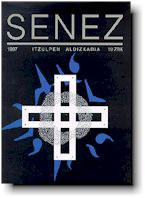Senez 19 (1997)

- Date of publication: 1997
- ISSN: 84-7086-287-1
- L.D.: SS 1.289
- 140 pp.
All articles in this issue have been published in Basque and Spanish.
Presentation
Translation: Juan Mari Mendizabal
During the last fifteen years a great revolution has occurred in all fields of the Basque language — until recently only a dream for many, although for many others it is still not enough. Education, media, literature and administration are the four pillars of the blossoming that is happening in Basque, mostly in the Basque Autonomous Community, but also in Navarre — albeit to a minor degree. In this issue of Senez we are focusing on public administration, or, to be more precise, in Administration and Justice, which was the focal point during the sessions organised by EIZIE within the framework of the 1996 Summer Courses of the University of the Basque Country. For this issue we have gathered the papers delivered at these sessions, in the original language, following the lines of previous issues.
So this time we are dealing with the translation undertaken in the fields of Administration and Justice in the Basque Country, since we believe that the huge amount of work carried out over these fifteen years, as well as the current situation and the many problems still remaining unsolved deserve unhurried consideration. The very conferences organised by EIZIE, the numerous people attending them and the wide acceptance among and ample participation of translators clearly show that translators working in the fields of Basque administration and justice care about their work and that, beyond everyday work, they feel the need to reflect, the reason for this probably being that, so far, translators have been those most forgotten by the institutions in their efforts to standardise and socialise Basque. Or, what is worse, recently translation has been the source of trouble in the realm of Justice, due to the internal tugs-of-war between different bodies, the result being, as always, that the translator is surrounded by negative influences due to differences which are difficult to understand, without getting any protection whatsoever from the profession.
In this context, on the other hand, we must bear in mind that so far no translation degrees are being awarded at the university, and that many working in the profession have had no specific studies in the field. The results of the survey, which serve as an introduction for this issue, are quite clarifying in this regard, because they depict the situation clearly, as well as the working conditions, the training level and the concerns that translators working in these fields have about their profession. Amongst the articles in Basque, it is worth mentioning what a Basque-speaking judge has done concerning this issue, as it sheds light on the problems arising in the administration of justice, even in Basque-speaking areas. The rest of the articles deal with more practical problems that translators have to face in their everyday work, or with the task of proofreaders — or with the official value of Basque translations.
Besides the articles in Basque, and thus beyond the scope of our concerns (but, nevertheless, a good way to understand them), there are also a few texts in Spanish addressing different aspects of translation in Spain, Catalonia and the European Union. These articles are an interesting counterpoint which can help us see our own situation in a new light and learn from our neighbours. As mentioned above, an enormous amount of work has been carried out in fifteen years, we have come a long way, but even so we feel the need to reflect constantly, as there is still much to do. It is obvious that translators are ready, but the main initiative to standardise Basque translation as well and to provide the means to improve its quality is in the hands of those in charge of Administration and Justice, and of other players in that sphere. This issue of the magazine addresses these issues as well.
Finally, we want to thank the University of the Basque Country for the help we received to organise the summer course and for publishing this issue.



